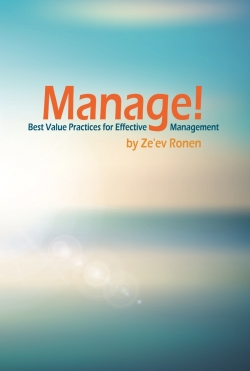The late Moshe Berechman taught me the saying "tall fences make good neighbors".
At the time Moshe was the CEO of Eyal Optics, and I was just starting as the CEO of Shamir Optical Industries. Shamir Optical and Eyal Optics had a complex relationship. On the one hand Eyal were our clients. We supplied them with glass molds for manufacturing plastic multifocal lenses, and they owed us a lot of money. One the other hand, Eyal were our "home lab".
We had started selling molds for multifocal lenses internationally, but didn’t know much about manufacturing plastic lenses. We were very professional in creating custom molds for clients, but couldn’t really support them if they had problems in the casting process, without Eyal Optics' knowledge. Since we didn’t make plastic lenses ourselves, without Eyal Optics we couldn’t address clients' complaints. So we couldn’t stop selling to them just because they owed us money.
There was also a third hand – at the time we would present at international conferences together in Europe and the US. That cooperation was a kind of declarative step.
The basis of that professional relationship was a personal and friendly relationship. There was no formal agreement to regulate it.
Moshe referred with his above words to this complex situation, and convinced me to sign a formal agreement. That agreement was meant to be the tall fence which will make us good neighbors. Moshe added that a good agreement is one that's signed, and then put in a drawer and isn’t needed further. The boundary definition inherent in it is enough in itself.
How Do You Make Agreements?
Do you anchor your business relationships in agreements, or do you "go with the flow"' and believe you can make do without agreements? If you work with agreements, who writes them? Are lawyers involved?
During my first year as CEO at Shamir Optical Industries, we had an agreement with an American company, that we would develop for them a multifocal lens and supply them with glass molds to cast their plastic lenses. This company was a few sizes too big for us, and it was clear that working with them will change Shamir Optical Industries from end to end. We knew that with this deal in our pocket we'll be a different company. We really, really wanted it.
Towards the Agreement that Changed Shamir Optical Industries
The VP who was in charge of the deal on their end and who had a verbal agreement with us on price, schedule, and design, handed the deal over to their legal department. They sent us a long agreement to sign, in English of course. I couldn’t handle that agreement draft alone, and I knew it. I passed it on to our lawyers: the late Dr. Zvi Tamir and Michal Ilani.
Both were of that rare breed of lawyers who understood that a deal had to be made, that business had to happen. They also understood the power differential. They had a meeting with me, and explained the various meanings of all the clauses one by one, until we reached one of the last ones. That clause seemed at first innocent, but they made it clear we couldn’t agree to it. It stipulated that in the case of a lawsuit by a third party for copyright infringement, we would be liable for all of their legal costs.
Although we had the knowledge, the ability and the intention of developing a multifocal lens for them on our own, we couldn’t guarantee that one of the other large companies won't decide to sue – even a false suite in order to stop them.
If that clause had stayed in the agreement and we had been sued, we wouldn’t have been able to fund the legal costs alone, and would have reached bankruptcy or closed.
Following my meeting with Tamir and Ilani, I wrote to the VP we were in contact with, saying we accept the agreement, except one clause. We develop the technology ourselves and have no intention of stealing knowledge from anyone – but as a small company we can't sign an agreement with such a clause. We don’t have the financial ability to withstand it.
The American company forwent the clause, we signed the agreement, and the rest is history.
Without the input from our lawyers, neither I nor anyone else in the company had the required legal knowledge to understand what that clause really meant.
On the other hand, if at the time we had nitpicky lawyers who went to war over every word or label, this important deal would not have happened.
Who Are the Lawyers You Choose to Accompany You?
Prof. Dan Ariely describes the damage lawyers can do to businesses. In his book "Payoff: The Hidden Logic That Shapes Our Motivations", Ariely writes that although contracts are a necessity, the way they're formulated, articulated, and the conditions they hold can easily destroy trust and good will.
I'm afraid that to a large extant things are as Ariely writes. But they don’t have to be. It all depends on you, on the lawyers you choose. Of the lawyers I've met, most turn the unimportant into the focus and can damage the reasonable development of business. As Ariely relates about lawyers who worked with a certain company: they tried to prepare for unlikely possible scenarios which, when included in contracts, sounded like accusations, like suggestions that the suppliers weren't careful and didn't know how to do their jobs. This destroyed good will.
Since the lesson I learned from Zvi Tamir and Michal Ilani, and up to this day, I make sure to only work with lawyers who understand that business has to take place. That agreements are essential, but aren’t everything. There's negotiation, and in it you insist only on those issues over which you're willing to lose the deal.
Language and Style
The language and wording of an agreement are also very important. When I send an agreement to a person or organization I want to work or cooperate with, I try to avoid the legal jargon often used in such agreements – it is immediately off-putting, creates resistance, and damages the good will for doing business together. You can achieve almost the same goal with simple language. When Nitzan Shay, a lawyer I've been working with for years, writes agreements for me – he uses simple language and focuses on the main points.
When I receive an agreement to sign, I search it for any conditions I can't accept. If such conditions exist, I present it to the other party. Usually, they're not aware of what's written in the agreement sent to me, and the problem conditions are removed.
Offer and Acceptance
Agreements don't have to be worded using legal jargon or printed on official paper with the company's logo.
Whenever one party makes an offer and another party accepts it, they have an agreement. It's called "offer and acceptance". In order to avoid misunderstandings, it's best to do this in writing, and not only verbally. "Writing" can mean – written by hand on a napkin from a café.
Offer and acceptance can be legally binding, so I recommend you make sure to fully consider the implications of all parts of the agreement before entering it.
When making an agreement, use your strong points to your advantage. During the negotiation with the American company described above, I used two sources of strength: the first was our weak position, and the second my insistence that without the removal of the problem clause, we'll have to cancel the deal completely. A deal both sides wanted very much.
Employment Agreements
Employment agreements are necessary for the employer. For two main reasons: first, defining employment conditions, and second – matching expectations. If the employer doesn’t have an agreement setting employment conditions, they might find themselves open to lawsuits, and will have to provide conditions they didn’t initially mean to. Another important aspect is, as I said, matching expectations. Even if the employer isn’t open to lawsuits, a gap in expectations, between what employees expect to get and what the employer intends to give, creates discontent, lowered motivation, and even turnover.
But take notice – whenever the employment agreement isn't in line with local labor laws – the latter apply. Even if an employee signed an agreement and has worked according to it for years, they can sue for the conditions mandated by law. In such a case, it's the law that counts, not the employee's signature, which could even by presented as "blackmail".
Remember, if there's a contradiction between an agreement and labor laws, it's the laws that count, including retroactively.
Attempted Fraud in Agreements
A few years ago I represented in Israel a Canadian fund which looked for local companies to invest in. Several startups contacted me, which finished the first two or three years in an incubator and ran out of the funding which kept them running.
In order to get funding from an outside investor, they needed approval from the incubator, which was part owner in the startup. All agreement drafts I received from incubators had a hidden clause which allowed them to cancel the agreement at any point after receiving the funding. That meant I wouldn’t get my commission. These were pathetic fraud attempts, deceits which I saw again and again. I wouldn’t even put much effort into reading the agreement thoroughly. I began with a quick check for hidden fraud, and when I found it I didn't even bother to reply.
I have a rule to do business only with honest people or companies. Then an agreement is that tall fence which makes good neighbors – as I learned from Moshe Berechman – and not a guard against fraud.
Summary and Recommendation
Agreements are the tall fence which makes good neighbors. They're essential for most business relationships (and perhaps personal ones too). Once signed they can get shoved in a drawer, until you need to consult them. Agreements are important for aligning expectations.
When you begin to work with a company, and you have a friendship or personal relationship at the base of your business – remember that people can be replaced. Tomorrow new managers will lead the company, who don't know you and don’t know or accept the verbal agreements you had with the previous manager.
On the other hand, it's crucial to have agreements that focus on what's important, and not get bogged down by minutia or unlikely scenarios. Whenever an agreement gets stuck in esoteric dead ends – it becomes more likely to create resistance and mistrust, and can even torpedo the main things – business.
Some managers believe they can draft agreements themselves or negotiate them alone. I seek a lawyer's advice on the main points. There are legal aspects I'm not aware of. But you should choose your lawyers carefully. Many see agreements as the be all and end all, and forget that the point is to do business.
When I get an agreement to sign, I insist only on those clauses which are worth cancelling a deal over.
I recommend you use lawyers when it comes to agreements, but choose lawyers who understand that business has to take place. Deals need to happen.
If you are interested in my professional help, personally or for your company, the best way to contact me is to send a request through the Get in Touch form here.












 My First Book: Manage! Best Value Practices for Effective Management
My First Book: Manage! Best Value Practices for Effective Management